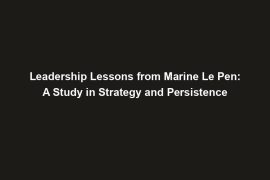Hey there, history buffs and aspiring leaders! Today, we’re diving into the fascinating world of Louis XVIII of France and the valuable leadership lessons we can learn from his reign.
Louis XVIII was a pivotal figure in French history, known for his resilience and adaptability during challenging times. Studying historical leaders like Louis XVIII can provide us with unique insights and perspectives on effective leadership practices that are still relevant today.
In this post, we’ll explore key leadership lessons from Louis XVIII’s reign, starting with the importance of adaptability and resilience. Louis XVIII faced numerous challenges and transitions during his time as king, yet he managed to navigate through them with grace and determination. We’ll dissect his strategies for adapting to changing circumstances and maintaining resilience in the face of adversity, drawing parallels to modern leadership situations where flexibility and resilience are crucial.
Additionally, we’ll delve into Louis XVIII’s approach to diplomacy and relationship building, two skills that were essential in his efforts to strengthen France’s position on the international stage. By studying how he cultivated relationships with other European powers, we can learn valuable lessons on the importance of diplomacy and relationship building in leadership, and how these skills can contribute to success in our own leadership roles.
So stay tuned as we uncover the leadership secrets of Louis XVIII of France and discover how we can apply these lessons to our own leadership practices. Let’s learn, grow, and lead like a king!
Leadership Lesson 1: Adaptability and Resilience
Now, let’s dive into the first leadership lesson we can learn from Louis XVIII – adaptability and resilience. This guy faced some serious challenges during his reign, from the aftermath of the French Revolution to Napoleon’s return from exile. But you know what? He didn’t let these obstacles bring him down. Instead, Louis XVIII showed incredible adaptability by adjusting his strategies and policies to navigate through turbulent times.
Think about it like this: Imagine you’re stuck in a sudden rainstorm without an umbrella. You could either stand there and get drenched, or you could quickly find shelter or make a makeshift umbrella out of a newspaper. Louis XVIII was like the person who found shelter or made that umbrella – he was quick on his feet and always ready to adapt to changing circumstances.
Not only did Louis XVIII adapt to challenges, but he also showed remarkable resilience in the face of adversity. He faced exile, political unrest, and multiple changes in government, yet he never gave up. Instead, he kept pushing forward and working towards his goals, no matter how tough things got.
Applying the Lesson to Modern Leadership
So, how does this apply to modern leadership roles? Well, in today’s fast-paced and unpredictable world, being adaptable and resilient is crucial for success. Leaders need to be able to pivot quickly, adjust their plans, and bounce back from setbacks. Just like Louis XVIII, they need to stay flexible in their approach and never lose sight of their long-term goals.
Whether you’re leading a team through a major change or navigating a crisis, remember the lessons from Louis XVIII. Stay adaptable, stay resilient, and keep pushing forward – you never know what you might achieve.
Leadership Lesson 2: Diplomacy and Relationship Building
Now that we’ve delved into Louis XVIII’s adaptability and resilience, let’s turn our attention to another crucial leadership lesson that can be learned from his reign: diplomacy and relationship building. Louis XVIII was a master of navigating the complex world of international relations during his time on the throne.
Exploring Louis XVIII’s Approach to Diplomacy
During his reign, Louis XVIII skillfully maneuvered through the tumultuous waters of European politics. He understood the importance of maintaining diplomatic relations with neighboring countries to ensure France’s stability and security. By forging alliances and negotiating treaties, he was able to strengthen France’s position on the world stage.
Cultivating Relationships for Success
One of Louis XVIII’s greatest strengths was his ability to cultivate strong relationships with other European powers. He understood that in order to achieve his goals, he needed the support and cooperation of his counterparts. By building trust and rapport with key leaders, he was able to navigate complex political landscapes and secure favorable outcomes for France.
The Importance of Diplomacy in Modern Leadership
Just like Louis XVIII, modern leaders can benefit greatly from honing their skills in diplomacy and relationship building. In today’s interconnected world, successful leadership often hinges on the ability to collaborate with others, negotiate effectively, and establish strong partnerships. By studying Louis XVIII’s diplomatic strategies, we can gain valuable insights into how to navigate the complexities of international relations in our own leadership roles.
So, as you reflect on Louis XVIII’s legacy, remember the importance of diplomacy and relationship building in leadership. These skills can be the key to unlocking success in today’s fast-paced and interconnected world.



